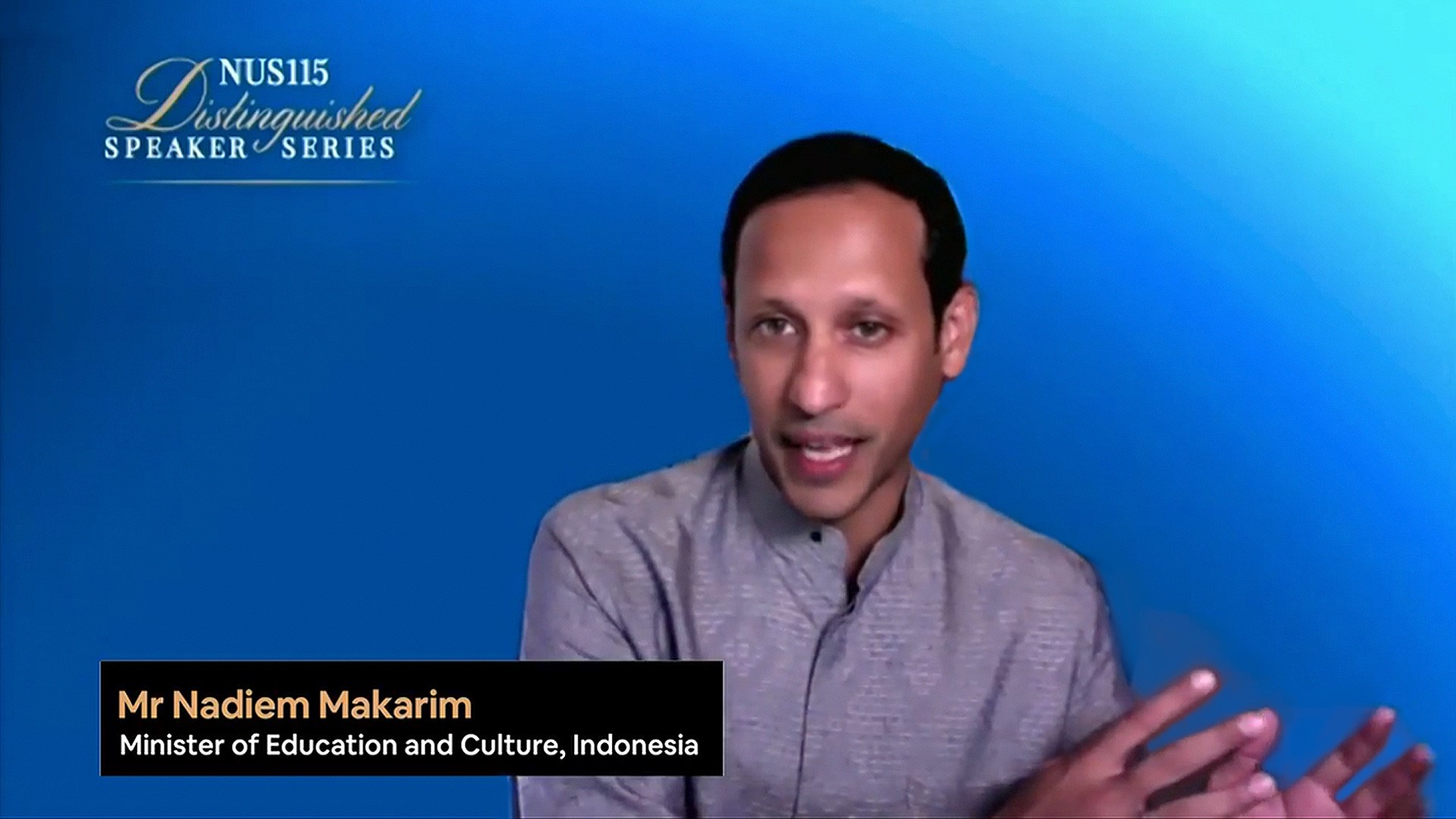Gojek co-founder’s tips for success: Don’t fear failure, keep learning, and be a team player
When Mr Nadiem Makarim was in high school, drama was a subject that often terrified him.
“It was the most painful thing to stand in front of all your friends and be scared of getting laughed at,” recounted Indonesia’s Minister for Education and Culture.
But it was also the subject that taught him the most valuable lesson: how to overcome the fear of failure. This ability to conquer self-doubts was what led him in 2010 to co-found Gojek, the technology start-up that is worth billions today.
“For every Gojek, I had so many ventures and start-ups that failed,” he said. “If you want to go down the entrepreneur route, you’re going to have to train your lizard brain (the part of the brain that processes emotions) to control your fear. Mental resilience is going to be the difference between who quits and who doesn’t.”
Mr Nadiem was speaking at the NUS115 Distinguished Speaker Series, which invites thought leaders to share their perspectives on pressing local, regional and global issues of the future. The inaugural session of the series featured Singapore Education Minister Mr Lawrence Wong who highlighted four key strategies to prepare students for the future.
Mr Nadiem, with his wealth of experience both in the private and public sector, graced the second session of the series. At the webinar on 26 Feb, “Shaping the Future of Work”, he shared reasons behind Gojek’s success and tips on how the young can prepare for the future in a rapidly changing workforce.
As NUS President Professor Tan Eng Chye noted in his opening address, traditional notions of work have been upended by the unprecedented speeds at which technological adoption and workplace digitalisation are taking place. “We are living and working in an era of technological upheaval, and in a climate of risk and uncertainty. We have all heard the saying that life will never be the same again,” said Prof Tan.
“But what does all this mean for the workforce of tomorrow? What is the future of work? How can we prepare our communities for the evolution of the job landscape? How can we help our youths to ride the opportunities that the new world offers?”
Getting ready for the workforce
Mr Nadiem was well-placed to answer this question, noted event moderator Ms Elaine Yew, a member of the NUS Board of Trustees and Senior Partner at Egon Zehnder.
“We are conscious that what we are asking you is tantamount to asking for predictions. Who can really tell the future?” Ms Yew told Mr Nadiem.
“But the good news is that since you spend most of your days thinking hard about this, and given that with Gojek you have created a piece of the future, I think you have all the conditions and credentials to be making good predictions."
The 36-year-old Mr Nadiem, who left Gojek in 2019 to join the Indonesian Cabinet, did not disappoint. He listed four things youth today could do to prepare for the workforce of tomorrow.
First, keep an open mind and never stop learning to stay relevant. “Have the confidence and motivation to learn new things for as long as you live,” he said. “Don’t depend on educational systems. Depend on yourself to find the resourcefulness to constantly seek and independently learn new knowledge.”
Second, try out new and different experiences from young. This is crucial as it would allow people to identify their passions and interests earlier, and work to develop them. “The key is to find something that will drive your intrinsic motivation to learn more,” he explained.
Third, build a variety of skill sets rather than specialise in one niche area. As industries become increasingly integrated, the demand for generalists has also spiked. “Having a wide view across disciplines is going to be a must in a hyper-changing world,” he said.
He also recommended growing social circles to meet people from different backgrounds and disciplines. This, he said, is “mission critical to understanding a holistic world view”.
Lastly, be a team player. “Having the ability to collaborate and effectively work in a team environment is going to be key to any professional success,” said Mr Nadiem.
In fact, there will be a premium placed on the ability to innovate collectively as the focus shifts to delivering the best customer experiences. “You’re not going to get far (by) being a superstar solo contributor,” he added.
Taking part in various group projects is a good way to hone this skill, he suggested, as that would teach lessons on how to work with different personalities to solve problems together.
Gojek’s recipe for success
Indeed, he attributes Gojek’s success mainly to good teamwork and the right talent.
“The biggest determinant of success is the collective quality and interaction quality of your core team members,” he said. “We heard this from investors – what makes Gojek is its talent. Never sacrifice talent.”
He also cited two other factors that helped turn the ride-hailing and digital payments firm into a household name in Asia.
Gojek did not only focus on getting good employees, but also strove to deliver services of the highest quality by de-prioritising any business objective for the sake of achieving the best user experience, he said.
Of course, luck also played a key role, and recognising this has allowed him to remain humble and retain a growth mindset, he added.
Ultimately, it is also about having the courage. to overcome the fear of failure and take the leap – just like what Mr Nadiem did.
“Mental resilience is going to be the difference between who quits and who doesn’t,” he said. “As it is with basketball, you miss 100 per cent of the shots that you don’t take.”






